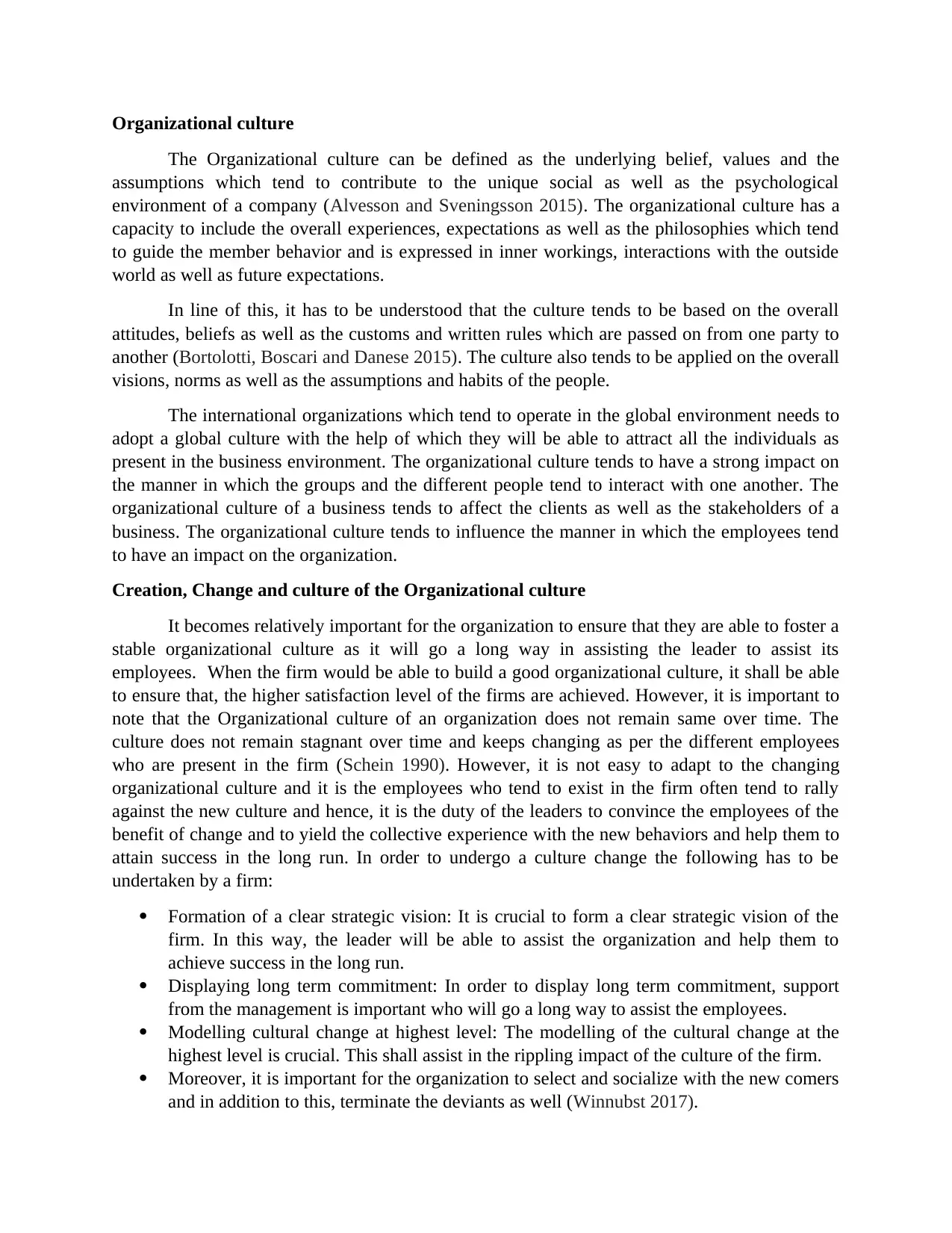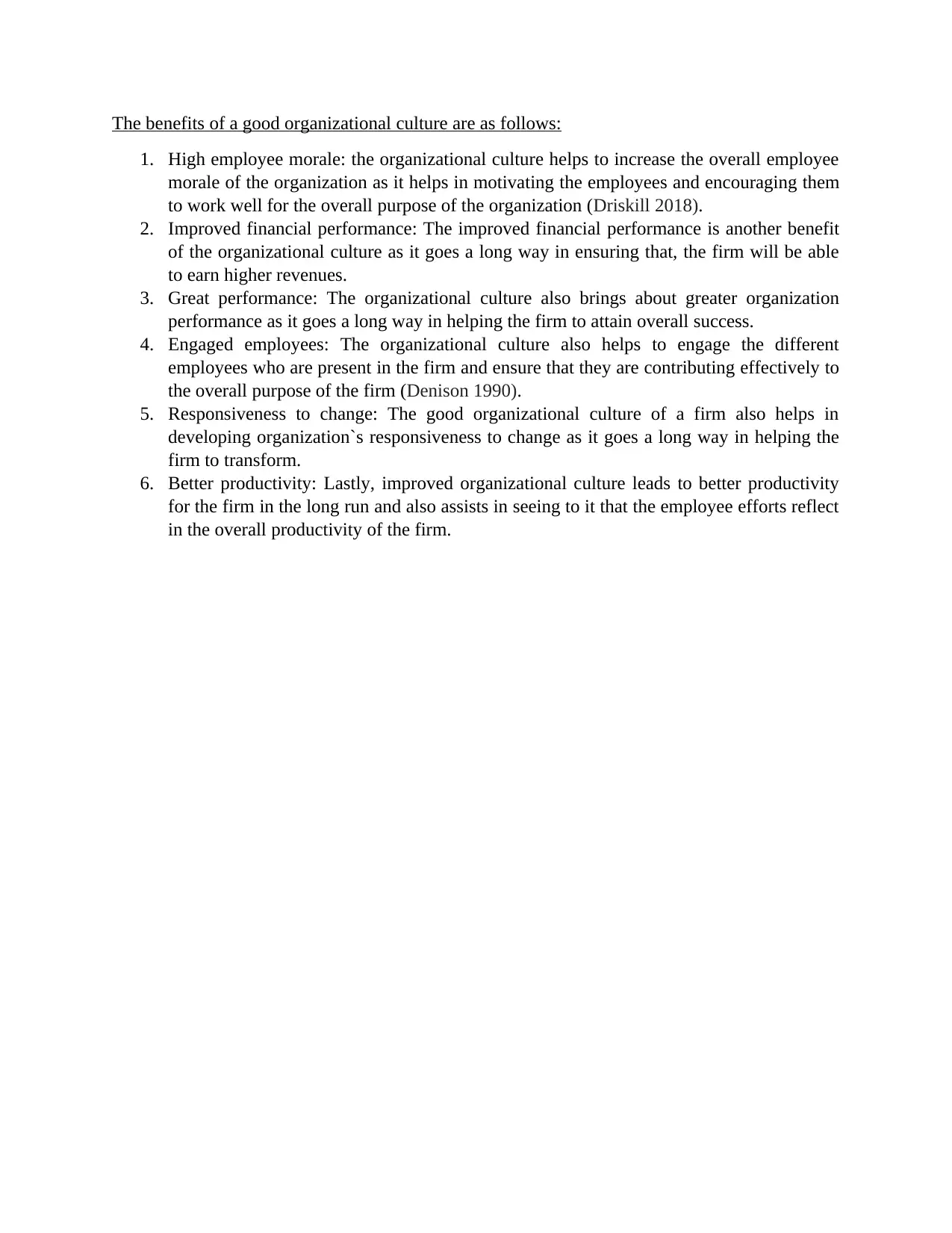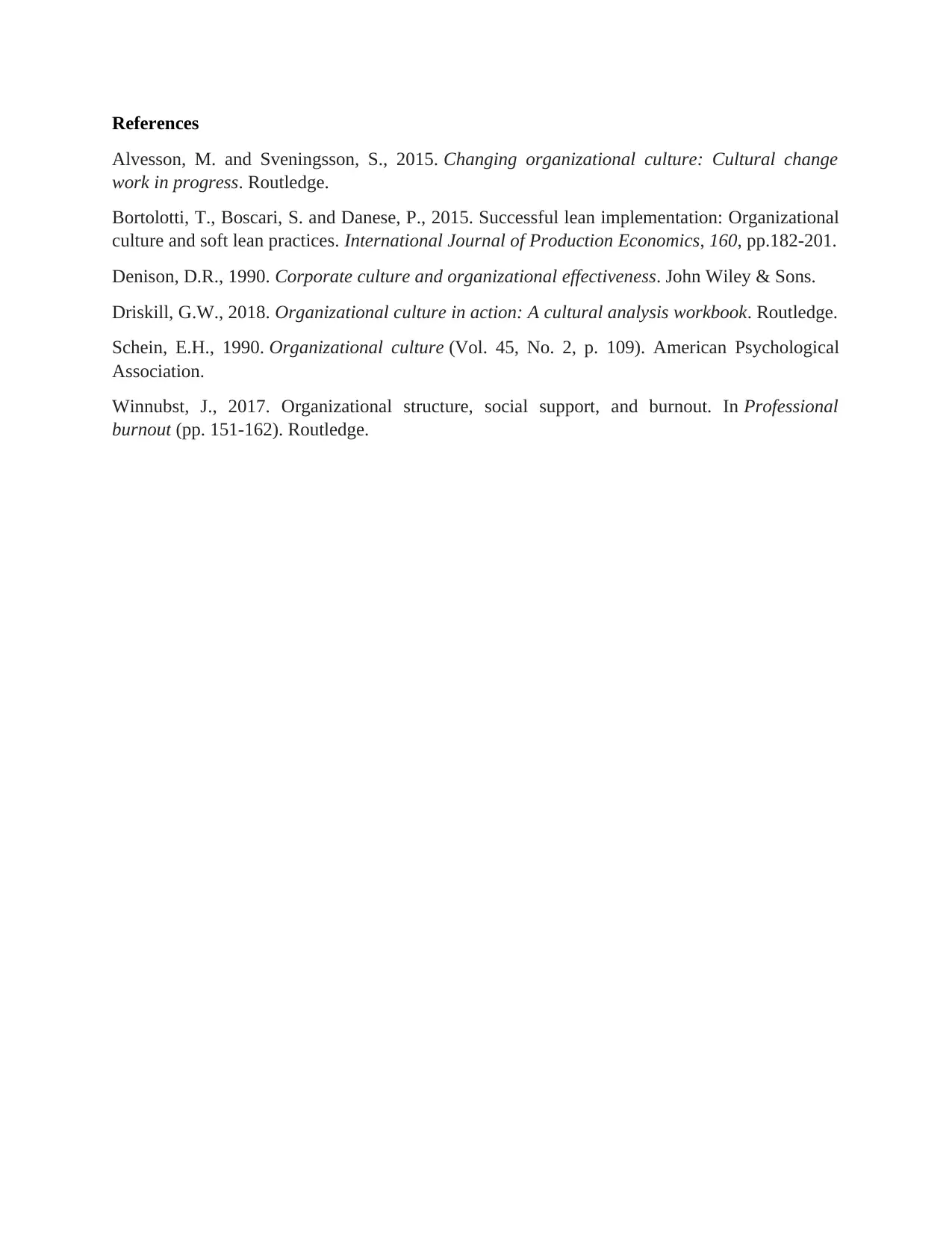Organizational Culture: MNC Analysis and Challenges
VerifiedAdded on 2023/01/18
|3
|1002
|75
Report
AI Summary
This report delves into the concept of organizational culture, defining it as the underlying beliefs, values, and assumptions that shape a company's social and psychological environment. It examines the creation and change of organizational culture, emphasizing the importance of a clear strategic vision, long-term commitment, and leadership modeling. The report highlights the benefits of a positive organizational culture, including high employee morale, improved financial performance, enhanced productivity, and responsiveness to change. Furthermore, it addresses the application of organizational culture within multinational corporations (MNCs), discussing organizational structures, potential challenges, and strategies for effective management. The report underscores the importance of adapting to changing cultural dynamics and fostering a global culture to attract individuals in the business environment.

Organizational culture
The Organizational culture can be defined as the underlying belief, values and the
assumptions which tend to contribute to the unique social as well as the psychological
environment of a company (Alvesson and Sveningsson 2015). The organizational culture has a
capacity to include the overall experiences, expectations as well as the philosophies which tend
to guide the member behavior and is expressed in inner workings, interactions with the outside
world as well as future expectations.
In line of this, it has to be understood that the culture tends to be based on the overall
attitudes, beliefs as well as the customs and written rules which are passed on from one party to
another (Bortolotti, Boscari and Danese 2015). The culture also tends to be applied on the overall
visions, norms as well as the assumptions and habits of the people.
The international organizations which tend to operate in the global environment needs to
adopt a global culture with the help of which they will be able to attract all the individuals as
present in the business environment. The organizational culture tends to have a strong impact on
the manner in which the groups and the different people tend to interact with one another. The
organizational culture of a business tends to affect the clients as well as the stakeholders of a
business. The organizational culture tends to influence the manner in which the employees tend
to have an impact on the organization.
Creation, Change and culture of the Organizational culture
It becomes relatively important for the organization to ensure that they are able to foster a
stable organizational culture as it will go a long way in assisting the leader to assist its
employees. When the firm would be able to build a good organizational culture, it shall be able
to ensure that, the higher satisfaction level of the firms are achieved. However, it is important to
note that the Organizational culture of an organization does not remain same over time. The
culture does not remain stagnant over time and keeps changing as per the different employees
who are present in the firm (Schein 1990). However, it is not easy to adapt to the changing
organizational culture and it is the employees who tend to exist in the firm often tend to rally
against the new culture and hence, it is the duty of the leaders to convince the employees of the
benefit of change and to yield the collective experience with the new behaviors and help them to
attain success in the long run. In order to undergo a culture change the following has to be
undertaken by a firm:
Formation of a clear strategic vision: It is crucial to form a clear strategic vision of the
firm. In this way, the leader will be able to assist the organization and help them to
achieve success in the long run.
Displaying long term commitment: In order to display long term commitment, support
from the management is important who will go a long way to assist the employees.
Modelling cultural change at highest level: The modelling of the cultural change at the
highest level is crucial. This shall assist in the rippling impact of the culture of the firm.
Moreover, it is important for the organization to select and socialize with the new comers
and in addition to this, terminate the deviants as well (Winnubst 2017).
The Organizational culture can be defined as the underlying belief, values and the
assumptions which tend to contribute to the unique social as well as the psychological
environment of a company (Alvesson and Sveningsson 2015). The organizational culture has a
capacity to include the overall experiences, expectations as well as the philosophies which tend
to guide the member behavior and is expressed in inner workings, interactions with the outside
world as well as future expectations.
In line of this, it has to be understood that the culture tends to be based on the overall
attitudes, beliefs as well as the customs and written rules which are passed on from one party to
another (Bortolotti, Boscari and Danese 2015). The culture also tends to be applied on the overall
visions, norms as well as the assumptions and habits of the people.
The international organizations which tend to operate in the global environment needs to
adopt a global culture with the help of which they will be able to attract all the individuals as
present in the business environment. The organizational culture tends to have a strong impact on
the manner in which the groups and the different people tend to interact with one another. The
organizational culture of a business tends to affect the clients as well as the stakeholders of a
business. The organizational culture tends to influence the manner in which the employees tend
to have an impact on the organization.
Creation, Change and culture of the Organizational culture
It becomes relatively important for the organization to ensure that they are able to foster a
stable organizational culture as it will go a long way in assisting the leader to assist its
employees. When the firm would be able to build a good organizational culture, it shall be able
to ensure that, the higher satisfaction level of the firms are achieved. However, it is important to
note that the Organizational culture of an organization does not remain same over time. The
culture does not remain stagnant over time and keeps changing as per the different employees
who are present in the firm (Schein 1990). However, it is not easy to adapt to the changing
organizational culture and it is the employees who tend to exist in the firm often tend to rally
against the new culture and hence, it is the duty of the leaders to convince the employees of the
benefit of change and to yield the collective experience with the new behaviors and help them to
attain success in the long run. In order to undergo a culture change the following has to be
undertaken by a firm:
Formation of a clear strategic vision: It is crucial to form a clear strategic vision of the
firm. In this way, the leader will be able to assist the organization and help them to
achieve success in the long run.
Displaying long term commitment: In order to display long term commitment, support
from the management is important who will go a long way to assist the employees.
Modelling cultural change at highest level: The modelling of the cultural change at the
highest level is crucial. This shall assist in the rippling impact of the culture of the firm.
Moreover, it is important for the organization to select and socialize with the new comers
and in addition to this, terminate the deviants as well (Winnubst 2017).
Paraphrase This Document
Need a fresh take? Get an instant paraphrase of this document with our AI Paraphraser

The benefits of a good organizational culture are as follows:
1. High employee morale: the organizational culture helps to increase the overall employee
morale of the organization as it helps in motivating the employees and encouraging them
to work well for the overall purpose of the organization (Driskill 2018).
2. Improved financial performance: The improved financial performance is another benefit
of the organizational culture as it goes a long way in ensuring that, the firm will be able
to earn higher revenues.
3. Great performance: The organizational culture also brings about greater organization
performance as it goes a long way in helping the firm to attain overall success.
4. Engaged employees: The organizational culture also helps to engage the different
employees who are present in the firm and ensure that they are contributing effectively to
the overall purpose of the firm (Denison 1990).
5. Responsiveness to change: The good organizational culture of a firm also helps in
developing organization`s responsiveness to change as it goes a long way in helping the
firm to transform.
6. Better productivity: Lastly, improved organizational culture leads to better productivity
for the firm in the long run and also assists in seeing to it that the employee efforts reflect
in the overall productivity of the firm.
1. High employee morale: the organizational culture helps to increase the overall employee
morale of the organization as it helps in motivating the employees and encouraging them
to work well for the overall purpose of the organization (Driskill 2018).
2. Improved financial performance: The improved financial performance is another benefit
of the organizational culture as it goes a long way in ensuring that, the firm will be able
to earn higher revenues.
3. Great performance: The organizational culture also brings about greater organization
performance as it goes a long way in helping the firm to attain overall success.
4. Engaged employees: The organizational culture also helps to engage the different
employees who are present in the firm and ensure that they are contributing effectively to
the overall purpose of the firm (Denison 1990).
5. Responsiveness to change: The good organizational culture of a firm also helps in
developing organization`s responsiveness to change as it goes a long way in helping the
firm to transform.
6. Better productivity: Lastly, improved organizational culture leads to better productivity
for the firm in the long run and also assists in seeing to it that the employee efforts reflect
in the overall productivity of the firm.

References
Alvesson, M. and Sveningsson, S., 2015. Changing organizational culture: Cultural change
work in progress. Routledge.
Bortolotti, T., Boscari, S. and Danese, P., 2015. Successful lean implementation: Organizational
culture and soft lean practices. International Journal of Production Economics, 160, pp.182-201.
Denison, D.R., 1990. Corporate culture and organizational effectiveness. John Wiley & Sons.
Driskill, G.W., 2018. Organizational culture in action: A cultural analysis workbook. Routledge.
Schein, E.H., 1990. Organizational culture (Vol. 45, No. 2, p. 109). American Psychological
Association.
Winnubst, J., 2017. Organizational structure, social support, and burnout. In Professional
burnout (pp. 151-162). Routledge.
Alvesson, M. and Sveningsson, S., 2015. Changing organizational culture: Cultural change
work in progress. Routledge.
Bortolotti, T., Boscari, S. and Danese, P., 2015. Successful lean implementation: Organizational
culture and soft lean practices. International Journal of Production Economics, 160, pp.182-201.
Denison, D.R., 1990. Corporate culture and organizational effectiveness. John Wiley & Sons.
Driskill, G.W., 2018. Organizational culture in action: A cultural analysis workbook. Routledge.
Schein, E.H., 1990. Organizational culture (Vol. 45, No. 2, p. 109). American Psychological
Association.
Winnubst, J., 2017. Organizational structure, social support, and burnout. In Professional
burnout (pp. 151-162). Routledge.
⊘ This is a preview!⊘
Do you want full access?
Subscribe today to unlock all pages.

Trusted by 1+ million students worldwide
1 out of 3
Related Documents
Your All-in-One AI-Powered Toolkit for Academic Success.
+13062052269
info@desklib.com
Available 24*7 on WhatsApp / Email
![[object Object]](/_next/static/media/star-bottom.7253800d.svg)
Unlock your academic potential
Copyright © 2020–2026 A2Z Services. All Rights Reserved. Developed and managed by ZUCOL.




